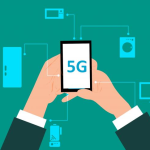One of the key benefits of 5G technology is its ability to support more connected devices at once, which is critical for the growing number of smart devices and the Internet of Things (IoT). With 5G, it is expected that devices will be able to communicate with each other in real-time, which can enable new applications such as remote surgery, autonomous vehicles, and smart cities.
5G technology relies on higher-frequency radio waves, known as millimeter waves, which allow for faster data transfer rates and greater bandwidth. However, these higher-frequency waves have a shorter range and can be easily blocked by obstacles like buildings and trees, so 5G networks require more cell towers and infrastructure than previous generations.
Overall, 5G technology is expected to be a major driver of innovation and economic growth, and it has the potential to transform the way we live, work, and communicate in the future.
5G in Malaysia
As 2021, Malaysia was in the early stages of implementing 5G technology. In fact, Malaysia was one of the first countries in Southeast Asia to launch a 5G network, with the Malaysian Communications and Multimedia Commission (MCMC) granting 5G spectrum bands to six telecommunications companies in February 2020.
At that time, the focus was on building 5G infrastructure in major cities and urban areas, with the goal of providing better connectivity and enabling new applications and services. The Malaysian government had also set up a 5G task force to oversee the rollout of 5G technology and develop a national 5G ecosystem.
Some of the potential applications of 5G technology in Malaysia include smart manufacturing, agriculture, and transportation, as well as improved healthcare services and education. However, the implementation of 5G technology in Malaysia may have progressed since my knowledge cutoff date, and there may be more recent developments that I am not aware of.
2021, Malaysia was in the early stages of implementing 5G technology. In fact, Malaysia was one of the first countries in Southeast Asia to launch a 5G network, with the Malaysian Communications and Multimedia Commission (MCMC) granting 5G spectrum bands to six telecommunications companies in February 2020.
At that time, the focus was on building 5G infrastructure in major cities and urban areas, with the goal of providing better connectivity and enabling new applications and services. The Malaysian government had also set up a 5G task force to oversee the rollout of 5G technology and develop a national 5G ecosystem.
Some of the potential applications of 5G technology in Malaysia include smart manufacturing, agriculture, and transportation, as well as improved healthcare services and education. However, the implementation of 5G technology in Malaysia may have progressed since my knowledge cutoff date, and there may be more recent developments that I am not aware of.
Communications and Digital Minister Fahmi Fadzil said Malaysia has the potential to become the “Asean Digital Tiger” by having a solid communication and digital infrastructure as well as strengthening cyber security issues, alongside creating digitally-literate citizens.
Fahmi said the robustness of the communications and digital infrastructure, and cyber security at a high level will give confidence to investors to choose Malaysia as a suitable investment destination in the region.
Fahmi noted that Amazon Web Service’s (AWS) decision to invest RM25.5 billion in Malaysia is an early sign of investors’ confidence in the country’s administration and political stability.










